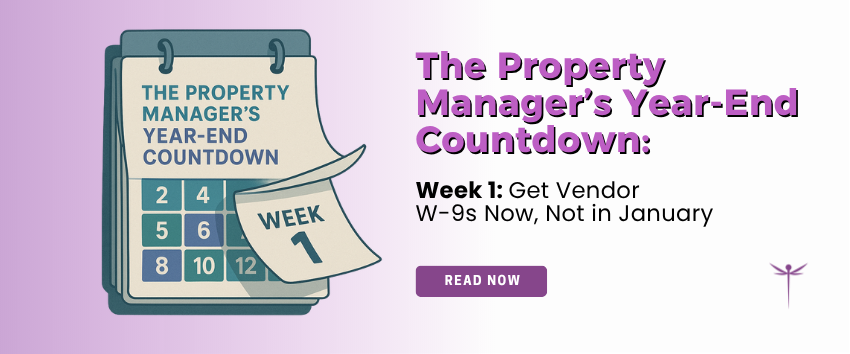Get Vendor W-9s Now, Not in January!
The Pain of Waiting Until January
It’s 3 AM on January 29th. You’re on your 15th email to a landscaper who still hasn’t sent their W-9. The IRS penalty clock is ticking. You’re frustrated, the vendor is unresponsive, and the stress is enough to keep you awake all night.
Sound familiar? You’re not alone. Many property managers push W-9 collection to the last minute and then face a pile of incomplete files, frantic follow-ups, and the looming threat of fines. The good news: this chaos is avoidable if you start now.
Why W-9 Collection Matters
Collecting W-9s isn’t just busywork — it’s the foundation of smooth year-end reporting. Here’s why it matters:
Information Source for 1099s – W-9s provide legal names, business structures, and taxpayer IDs (TIN/EIN or SSN). Without this info, you simply can’t prepare 1099s correctly.
Avoid Backup Withholding – If you don’t have a W-9 on file, the IRS requires you to withhold 24% of vendor payments. No one wants that kind of mess at year-end.The penalties and interest are huge for non-compliance if audited!
Accuracy & Fewer Errors – Collecting W-9s early means fewer mismatches, fewer “B-Notices” from the IRS, and no frantic scrambling when deadlines hit.
Professionalism & Process – Asking for W-9s before the first payment shows vendors you run a tight ship. It sets expectations early and keeps compliance from becoming a headache later.
Collecting the W9 is just the first part in the process. Issuing the 1099 is CRITICAL:
IRS Compliance – The IRS requires businesses to file 1099s to track payouts for services and things like rent.Missing this step can lead to hefty penalties.
Audit Protection – Filing 1099s signals to the IRS that you’re tracking expenses properly. It reduces red flags and protects you in the event of an audit.
Accurate Financial Records – 1099s help reconcile vendor payments against your books so your expenses are clean, complete, and defensible.
Protecting Deductions – If you don’t issue 1099s, the IRS can disallow those deductions on your tax return. That means higher taxable income — and higher taxes.
This isn’t just about paperwork. It’s about protecting your time, avoiding penalties, and making sure your financials hold up under IRS scrutiny.
Your Week 1 Action Plan
This week’s goal is simple: start the chase now. Dedicate 1–2 hours and you’ll save yourself weeks of stress in January.
Step 1: Export Your Data (30–60 minutes)
Pull a full report of owners and vendors from your accounting or property management system (Streamline, QuickBooks, etc.).
Confirm you have complete records, including legal name, Tax ID, mailing address, and email.
Step 2: Identify Missing Information (30–60 minutes)
Highlight anyone missing required details.
Cross-check that any new W-9s you’ve received this year have been updated in your system.
Step 3: Create a Follow-Up Plan (15–30 minutes)
Decide how you’ll reach out: email, phone calls, or portal messages.
Prioritize high-volume vendors or those with larger payouts to avoid delays later.
Step 4: Reach Out Individually (5–15 minutes per contact)
Send emails first.
Escalate to phone calls if you don’t hear back.
Keep track of every outreach attempt so nothing falls through the cracks.
Step 5: Draft a Mass-Message to Vendors and Owners (30 minutes)
For vendors or owners with no issues, send a general reminder. Example:
“It’s that time of year again! If you’ve had changes to your tax information, please send us an updated W-9 by [DATE] so our records stay current.”
Step 6: Weekly Review (15 minutes each week)
Track who still hasn’t responded.
Set reminders for yourself or your team to follow up.
Escalate outreach as deadlines approach.
And Remember - Delegate Where Possible
Assign tasks and deadlines to your team.
Drafting emails
Reaching Out/Following Up
Tracking The Progress and Giving you Updates
Adjusting or Updating your system(s) with the new records
Your Team is your biggest resource - don’t take on everything alone! Where possible, save your time for reviewing exceptions or problem cases.
The Payoff
These small, intentional steps now will save you headaches, angry emails, and potential IRS penalties in January. Think of this as an investment in your own peace of mind. By handling W-9s early, you can start the new year with confidence instead of panic.
This is just Week 1 of our 12-part Year-End Countdown for Property Managers. Stay tuned for Week 2 next week!

